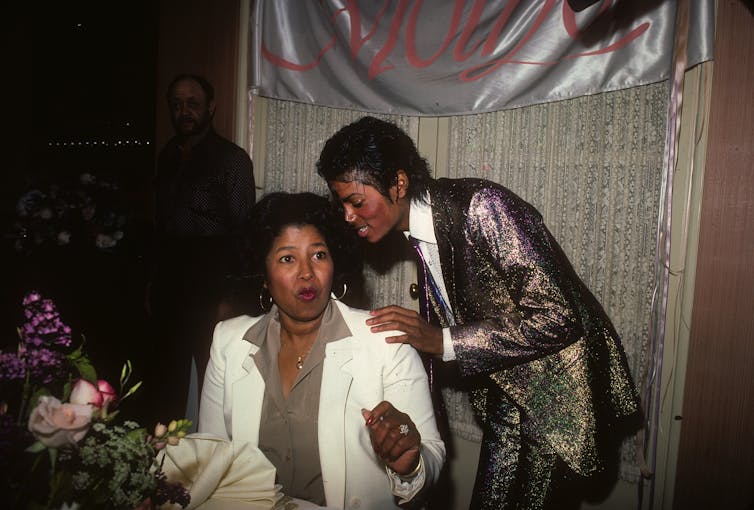When Michael Jackson died in 2009, he left a complicated legacy. But one thing remains true: The King of Pop’s music still generates millions of dollars every year. A Jackson biopic is expected in 2025, and “MJ,” his Broadway show, brought his music to theaters around the world.
But despite the continued success of Jackson’s music, his estate has remained in limbo for more than a decade. This is due to a long-running tax dispute over more than US$700 million allegedly owed to the IRS and other legal challenges.
The latest development in the saga occurred on August 21, 2024, when a California appeals court approved a $600 million asset sale proposed by Jackson’s estate.
As law professors who teach trusts and estates, we believe Michael Jackson’s estate offers a lesson for anyone considering writing a will — even if they don’t have King-of-Pop-level wealth.
The mother and the multinational
When Jackson signed his will in 2002, he left almost everything to his children through a trust; his mother has a small interest in his life.
His will also included a joint provision empowering his executors – the people managing his estate – to sell the assets of the estate “on such terms as the Executors think best”. Any proceeds from the sale would then be distributed to his children.
In February 2024, Jackson’s executors negotiated what The New York Times described as a “blockbuster deal” to sell a significant portion of Jackson’s music catalog to a joint venture with Sony for $600 million.
Jackson’s mother, Katherine Jackson, objected, however, in part because, as the court explained, “Michael told family members before his death that the assets should never be sold.

Jeffrey Mayer/WireImage via Getty Images
But in mid-August, a California appeals court rejected Katherine Jackson’s request in a final ruling that approved the proposed sale.
Legal requirements for a valid will
While it is common for people to discuss estate plans with family and friends, those wishes are not legally enforceable unless they have been set forth in a valid will, trust, deed or contract.
In most states, including California, where Jackson died, a will must usually be in writing, signed by its maker—called a “testator”—and signed by two witnesses who observed the testator sign the will.
These requirements allow courts to distinguish early drafts and memoranda from the final version that the testator intends to take effect upon death. These rules also oblige testators to keep reliable evidence of their estate plan, which becomes useful in probate proceedings that take place in court after the testator’s death.
Interpretation of a testamentary text
When the meaning of a will is unclear, courts let witnesses testify as to how the text should be interpreted. Katherine Jackson provided this type of testimony, arguing that when Michael gave his “entire estate” to his trust, he intended the trust to receive the estate assets largely in the same form as they existed when Michael died.
According to Katherine, Michael wanted to trust his music catalog, not the proceeds from the sale of his music catalog or even partial management rights to that catalog.
But the court disagreed with Katherine’s interpretation because Michael’s will also gave his executors broad powers while the estate was being probated. The court explained that the trust would receive distributions from the estate, but the executors had “full power to sell real property” while managing the estate.
Bailiff’s power to sell real estate
During estate planning, people often overlook the importance of executor powers because they are among the most technical terms of a will. But the battle over Jackson’s fortune shows that executive powers can play a major role in the administration of the estate.
Estate planning attorneys typically advise clients to give executors broad powers to buy and sell real estate during probate so they don’t have to waste time and money seeking court approval for routine transactions.
Broad executor powers, as provided by Jackson in his will, therefore reduce long-term transaction costs. This increases the net worth of the wealth ultimately distributed to the beneficiaries. Fiduciary law protects the estate by making executors personally liable for any abuse of power.
Estate planning for special assets
When advising clients with unique assets, such as Michael Jackson’s music catalog, estate planning attorneys typically discourage testators from restricting the sale of prized property. That’s because it can be difficult to predict how circumstances might change in the future.
In a famous example of that misstep, 20th-century media titan Joseph Pulitzer—the founder of the Pulitzer Prize—left behind a will that prohibited his executors from selling any stock in his prized newspaper business.
Twenty years after Pulitzer’s death in 1911, that newspaper business became unprofitable. So Pulitzer’s trustees asked a New York court for permission to review the will, arguing that Pulitzer had failed to anticipate his newspaper’s changing fortunes. The court agreed, finding that “continuing publication of the newspapers … will in all likelihood result in serious damage to or destruction of a large part of the trust estate.”
The Pulitzer case shows how narrowly curtailing the powers of executors and trustees can backfire, a problem Jackson’s lawyers clearly hoped to avoid.
Estate Planning Lessons
An estate plan is enforceable only if formalized in a document, such as a will. Once formalized in writing, courts are reluctant to change an estate plan based on posthumous testimony about the testator’s oral statements—even when those wishes are expressed to a parent.
Therefore, testators should pay close attention to each provision of a will, including technical terms that may require explanation by the drafting attorney. Also, testators should be careful: it can be tempting to control property from the grave, but restrictions that seem desirable during life can backfire after death.
#Estate #planning #lessons #million #fight #Michael #Jacksons #music #catalog